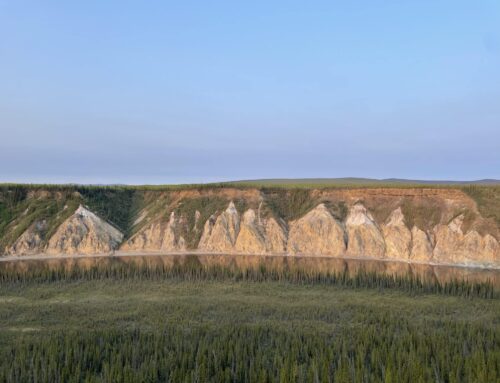During the current economic slump, fiscal watchdog groups and hunting organizations are calling on the U.S. Bureau of Land Management to suspend perfunctory auctions of oil and gas leases on public land in the West.
On Tuesday, representatives of Conservatives for Responsible Stewardship, Taxpayers for Common Sense and the National Wildlife Federation’s Artemis Sportswomen Initiative came together to oppose BLM oil and gas lease auctions, particularly the seven scheduled this month, including one in Nevada held this week.
They say lease sales aren’t bringing in adequate money to offset the loss of public access and other natural resource uses, so auctions should be put on hold.
“Given the level of U.S. production coming out of North Dakota and Texas, the Trump administration’s mad rush to lease out vast portions of the West to oil and gas companies has never made much sense to us,” David Jenkins, president of Conservatives for Responsible Stewardship, said in a Tuesday press call.
The BLM did postpone auctions scheduled in May and June after environmental groups filed a protest, saying the pandemic made public comment and involvement difficult. But now, the agency is moving forward with auctioning off those parcels and then some.
Autumn Hanna of Taxpayers for Common Sense, a nonpartisan government budget watchdog, said not only are the September auctions putting a huge amount of land up for lease – more than 500,000 acres – but also this year’s auctions are bringing in very little money for all that land.
Companies are bidding less for parcels, on average, than in previous years. Often, the highest bid, and sometimes the only bid, comes in at $2 an acre, the minimum amount you can bid. The BLM hasn’t changed the amount it charges for rental rates – $1.50 an acre – or minimum bids since the 1980s.
“For years, taxpayers have lost valuable revenue to outdated policies,” Hanna said. “But during the Trump administration, things have gotten far worse, with lease offerings significantly up and revenue dramatically down. Bidding overall has dropped, but oil and gas companies are getting more for less.”
Then there’s the increasing number of noncompetitive leases left over after each auction. Companies ask for a parcel to be leased, and then they don’t bid on it, knowing their identity isn’t made public. Any parcel not auctioned off is put up for sale where companies can buy it with no bid, cheating Americans out of additional tax revenue and locking up more land for less money.
That appears to be what’s happening in Nevada. The state doesn’t have the type of geology that contains reservoirs of oil and gas, and yet, it ranks third in the amount of acres offered for lease, behind Wyoming and Alaska. Since the area isn’t likely to yield oil or gas, leases have sold on only 8% of the 2.5 million acres offered at auction during the Trump administration. Of the parcels leased, three-quarters received only a minimum bid, Jenkins said. And yet, the rest of the leases are sold.
“Why is the BLM engaging in this flimflam? If industry interest is so paltry, who is nominating all this land for lease?” Jenkins said. “Since this is being done at taxpayer expense and to the disadvantage of other resource users, the American public deserves some answers.”
The BLM Montana-Dakota Office will have more than 17,000 acres up for bid in its auction on Sept. 22. Marcia Brownlee of Artemis Sportswomen said hunters and wildlife advocates should be concerned, because almost 12,000 acres of that is in mule deer and antelope winter range in eastern Montana. If the parcels are leased, hunting could be limited even more than it already is in the eastern region of Montana dominated by private land.
“When these lands are leased, they are not managed for anything else,” Brownlee said. “What’s happening now is speculative leasing by fly-by-night companies hoping that the market conditions will change and they can turn around and sell it for a profit. We must stop this unfair practice.”
During the May comment period on the Montana lease sale, some asked the BLM to defer the lease sale until at least half of all federal leases are in production. The BLM said it wasn’t able to do that because the 1920 Mineral Leasing Act and the 1987 Federal Onshore Oil and Gas Reform Act require the BLM to hold quarterly sales if land is available for competitive leasing, although it says nothing about noncompetitive leasing.
The BLM did pull five parcels from the auction after commenters questioned their inclusion and after four out of five nominators withdrew their nominations. The fifth couldn’t be reached.
Brownlee said now is the time to update 100-year-old laws to be more fair to the public. If parcels are leased, they should get the highest return possible to make it worth the loss to the public, Brownlee said.
According to the Congressional Budget Office and GAO, updating the fiscal rates and policies for federal oil and gas leases could generate upwards of $1 billion in new revenue for federal and state taxpayers over the next decade, with “negligible” impacts on production.
Interior Secretary David Bernhardt and BLM acting co-director William Perry Pendley have taken several actions to make things easier for the extractive industries, so it’s unlikely that they would heed the groups calling for suspending the auctions. But if proposed Forest Service rule changes go through giving the BLM full authority over oil and gas leases on Forest Service land, the situation could become even more dire.
Hanna said the groups aren’t considering legal action but instead are hoping Congress might act. They are watching two bills that would give taxpayers a better deal by increasing royalty rates and minimum bids.
Rep. Ben McAdams (D-Utah) introduced the Taxpayer Fairness for Resource Development Act a year ago. In February, Sen. Tom Udall, D-N.M., introduced the Fair Returns for Public Lands Act. But they have yet to be heard in committee and are unlikely to pass before a new Congress starts next year.
So stopping September’s auctions may call for public opposition, and some Montanans have experience there.
In May, Montana federal district judge Brian Morris ruled in favor of landowners and environmental groups saying the BLM hadn’t done a thorough analysis of the environmental effects of drilling on 150,000 acres in Montana, so he vacated 287 leases that had been auctioned off in 2017 and 2018.
In February 2019, the BLM withdrew almost 13,000 acres in Beaverhead and Madison counties from a lease auction after receiving negative public comment.
“We have had success deferring leases when communities speak out,” Brownlee said. “So one of our goals is to continue to amplify the conversation and educate the public about what’s happening. And why it’s bad for us as taxpayers and public landowners and hunters and anglers who care about the future of our sporting heritage and how important it is for the public to use their voice and speak up.”
Jenkins said the BLM’s decision to delay May and June lease sales shows that public pressure can have an effect.
“There’s power in that, especially when you’re in an election season,” Jenkins said.











Get Social